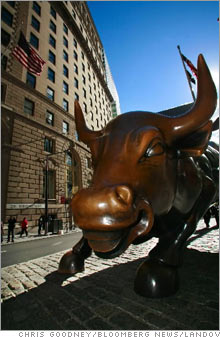Wall Street's next scandalThe SEC is investigating whether some of Wall Street's top investment banks are using inside information. Fortune's Shawn Tully explores the potentially explosive scandal.(Fortune Magazine) -- In early February, the SEC confirmed that it was investigating whether the major brokerage houses were tipping off hedge funds to the trades the brokers handle for big clients like mutual funds. If that's happening, it would be a scandal. The SEC is also likely to scour trading records to see if the brokers are using info about clients' moves to invest their own capital. If the SEC finds evidence that they are, the scandal would be enormous - and go to the heart of Wall Street's profit machine.
A big question mark hangs over Wall Street: How is it that the top firms consistently beat the odds, earning spectacular returns on their own investments? Last year the five biggest U.S. investment banks - Morgan Stanley (Charts), Goldman Sachs (Charts), Merrill Lynch (Charts), Lehman Brothers (Charts) and Bear Stearns (Charts) - generated $61 billion from proprietary trading, about half their total revenue and a 54 percent increase over 2005. Those returns have raised eyebrows for years. "Even the greatest investors lose money at some point, but the Wall Street firms never seem to lose," marvels Tiger Williams, chief of Williams Trading, a firm that attributes its success to keeping its hedge fund clients' trades strictly confidential. Some Wall Street insiders are pretty sure they know the secret. "Privileged information is the real currency that runs Wall Street," says Doug Atkin, the former CEO of Instinet who now runs the research boutique Majestic Research. "With what the traders at the big firms know, my 11-year-old son could make tons of money." Here's a hypothetical example, gleaned from former Wall Street traders as well as outsiders who worked closely with them, of how some people think the Street exploits information. Say a fund company, call it Big Dog, wants to buy a million shares of Intel. A Big Dog trader calls a broker at a Wall Street firm - call it Megabux. The broker enters the order into the Megabux trading system. A dozen Megabux "sales traders" get the info on their computer screens. Their job is to find sellers for the shares. But first they call their top hedge fund clients, giving them the chance to buy some Intel before Big Dog pushes up the price. To cover their tracks, the hedge funds don't buy the Intel shares through Megabux, but they reward their benefactor with a lot of other big trades and by paying higher commissions than the mutual funds do. That may not be the only way Megabux makes money on its knowledge of clients' trading activity. The broker who takes the order can pass the info on to Megabux's proprietary trading desk. The proprietary traders don't load up on Intel before Big Dog does - that would be illegal. But let's say they know that when Big Dog is interested in a stock, it usually ends up buying several million shares, and thus will soon purchase more. Megabux buys shares of Intel (or of a tech index fund that holds Intel, or even of other stocks in the sector) after the first order; when Big Dog returns for more, pushing up the price again, Megabux makes a quick profit. The practice is hard to trace and may or may not be illegal. But it still hurts investors in Big Dog's funds by forcing Big Dog to pay prices that are inflated by the leaks. (The brokers have said repeatedly that they have safeguards in place to make sure such activity doesn't occur.) Why would mutual funds put up with such abuse? "They need access to Wall Street's research and clearing services and to IPO allocations," says Atkin, so they have to keep trading with the big brokers. Even if mutual funds were to do all their trading on electronic systems like Liquidnet that promise anonymity, Wall Street has another potential source of intelligence - the hedge funds themselves. Some big banks have "prime brokerage" operations that clear and settle trades for hedge funds. The prime brokers see what hedge funds buy and sell every day, though they insist that they do not share that data with their proprietary traders. As part of its investigation, the SEC also demanded the names of the firms' prime-brokerage clients. So we may soon learn more about whether those sumptuous profits are a result of rare genius - or of an unfair edge. _______________________ |
Sponsors
|

